Adam Boulton: Sunak will not go quietly – and will do what it takes to shift the dial ahead of election
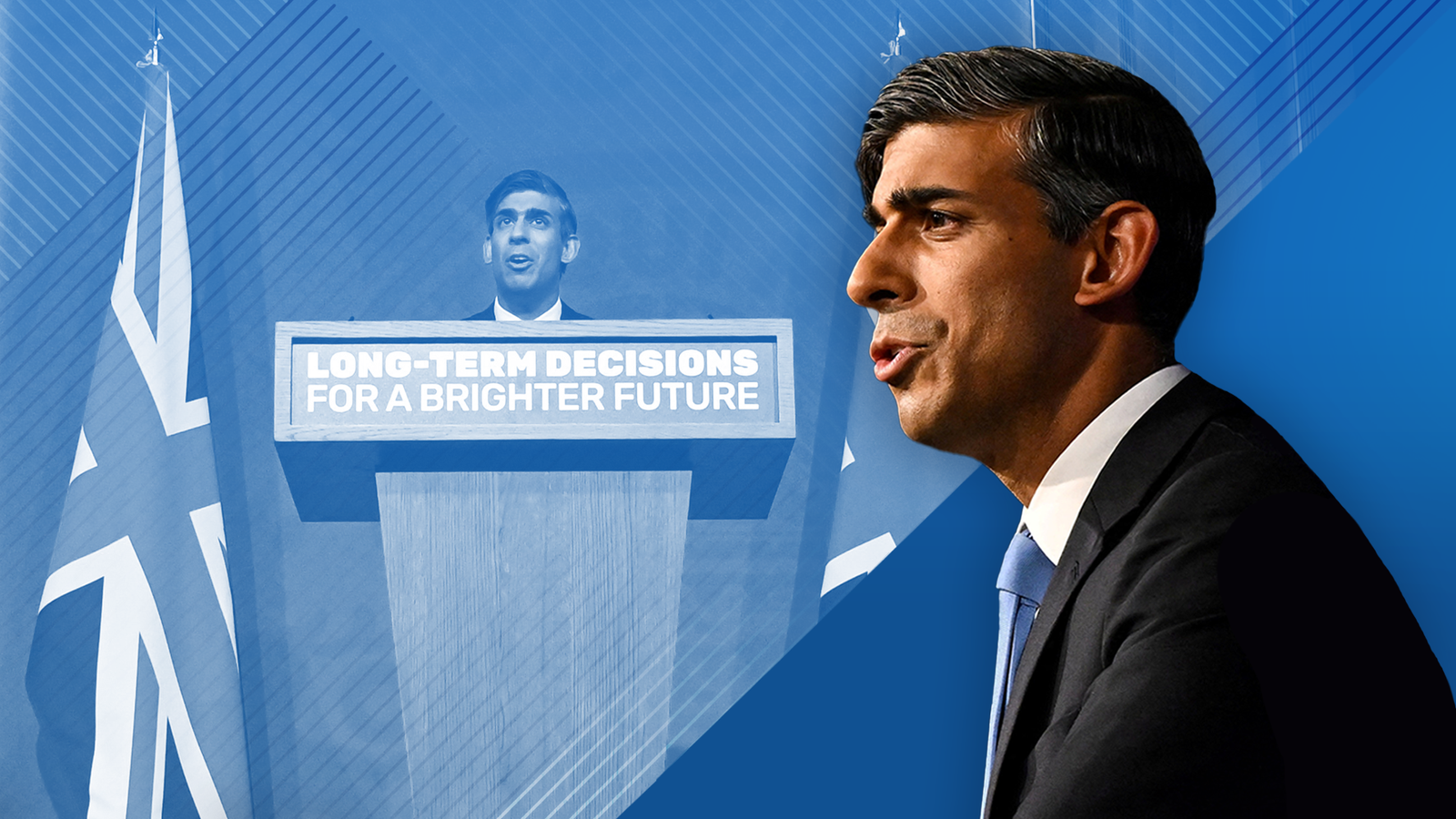
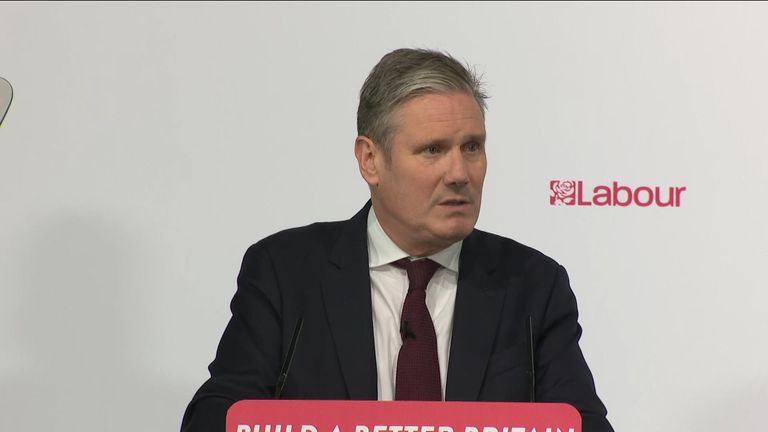
The last Westminster parliament to run for a full five-year term ended in 2015.
After that we had general elections every two years, in 2017 and 2019, followed by the election now expected by January 2025 at the latest, when this full term will expire.
Not that there has been political stability since 2019. Rather than consult the voters, the Conservative party have changed prime ministers twice in that time running through Johnson and Truss to Sunak.
In the past few days, it has felt as if the tectonic plates under Number 10 Downing Street were shifting again. There have been manifest signs of political panic and – obeying the old mantra of “never let a good crisis go to waste” – political opportunism as well.
Observing tell-tale signs that the government was gearing up under duress, I wondered if, just possibly, Rishi Sunak would go the way of Theresa May and Boris Johnson and deploy the prime minister’s ability to bring about a general election as a tactical weapon in campaigning.
Elon Musk has not yet managed to kill Twitter as a channel of constructive conversation, so I Xed a speculative “are we about to be plunged into a snap general election again?”
No, not this October, it turned out. The prime minister stuck to the planned content in the speech which media speculation had bounced him into delivering prematurely.
But what we saw from the prime minister should put us on alert. The electorate should stand by to be called to the polls at any moment.
Sunak has shifted into ruthless campaign mode and he will call an election if and when he sees any advantage in doing so.
Advertisement
His U-turn on net zero measures shows that he has made his choice on how he will fight it.
In the past two centuries no British party has won five elections in a row, as the Conservatives are seeking to do.
Sunak’s strategy is to try to present himself as something different, rather than Sir Keir Starmer as the “change candidate” from the past.
Amid the cost of living crisis, high mortgages and inflation, chaos in the NHS and disruption in schools, Sunak knows there would be little point in trying to run on the Conservative’s record in government.
Please use Chrome browser for a more accessible video player
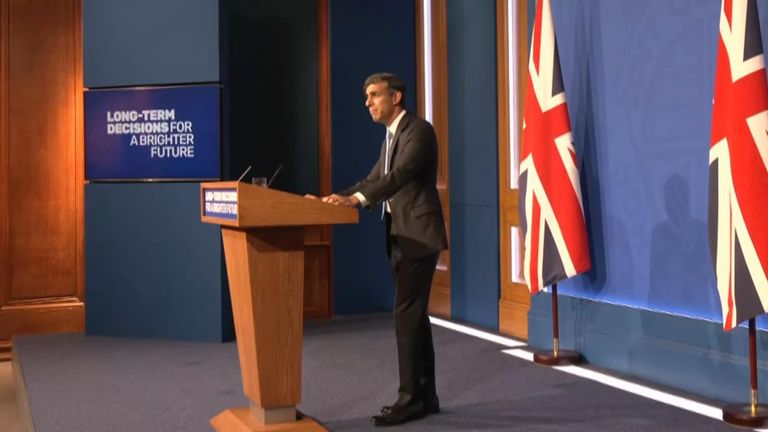
1:14
‘Not right to impose costs on people’
Read more:
Tories think Starmer has made strategic blunder
Sunak delaying ban on new petrol and diesel cars
He claims that he has restored “stability and confidence” in his first year as prime minister, now his new slogan “long-term decisions for a brighter future” attempts to turn the page on all the decisions the Tories have taken over their past 14 years in power.
Symbolically Sunak has torched the accelerated plans to phase out internal combustion cars and gas boilers, which underwrote his predecessor Boris Johnson’s boast that the UK was a “world leader” on net zero. He hopes that this drives a wedge between him and Starmer.
Setting his heffalump trap for Labour, the Conservative leader says it is for people who disagree with him to explain why they want families to pay an extra £5,000, £10,000 or £15,000.
Piling extra challenges for Starmer to overcome, he claimed to have scrapped compulsory extreme measures for a meat tax, seven recycling bins per household, and car sharing.
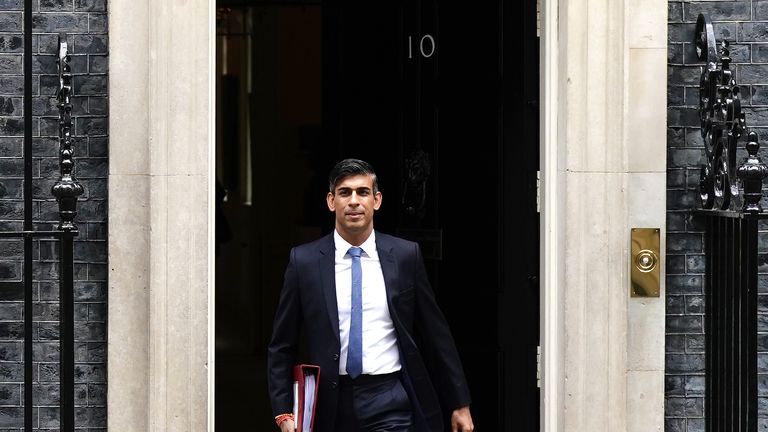
He and ministers have struggled to identify any examples of politicians advocating such measures, but that won’t stop Tory activists linking them to Labour on the campaigning trail.
Already at PMQs Sunak is happy to smear Starmer with allegations which are unfounded or which Starmer has ruled out on the record.
Sunak’s campaign strategy is reminiscent of Johnson’s “cakeism”. He wants to hold together the coalition of voters which delivered electoral victory in 2019.
So while reducing the, allegedly costly, green measures on net zero or sewage versus housebuilding, he simultaneously claims that he is sticking to the UKs environmental ambitions and commitments.
It could work. Nobody likes paying more when times are hard.
Sunak’s claims that he is still “passionately committed” to net zero and that the UK is still on course, provide an alibi for those disinclined to do anything more.
Those queuing up to attack Sunak’s policy shift include the United Nations, Al Gore, One Nation Conservatives and the mainstream media, precisely the supposedly “elitist” coalition which alienated Leave voters in the Brexit referendum and against Labour in old Red Wall constituencies.

Although irrelevant to global warming, the Labour Mayor of London’s imposition of ULEZ charges on polluting vehicles certainly helped the Conservatives to hang onto Johnson’s outer London constituency at a by-election. The 7.4% swing against the Tories was much less than in national opinion polls.
If the Conservatives pull off another “hold” in the Mid Bedfordshire by-election on 19 October, it will be taken as vindication of the new “common sense” strategy.
To stay in power, Sunak will need the votes of traditional Conservatives – older, relatively affluent and in the South.
The Conservatives are also generally doing poorly with younger demographics of working age below 50. The red scare of Corbyn pushed enough of them in the Conservatives’ direction.
It will be harder to paint Starmer as a similar threat, but that is unlikely to stop his opponents trying.
That is the Conservative’s best hope of holding together a winning electoral coalition. Initially Sunak’s green moves have fallen flat with Conservative environmentalists from Zac Goldsmith to John Gummer to the Climate Change Committee.
Big businesses are also openly dismayed, especially by the instability of chopping and changing legislated targets and guidelines.
Replies to my snap election ‘X’ were mostly either “bring it on” or “they wouldn’t dare”.
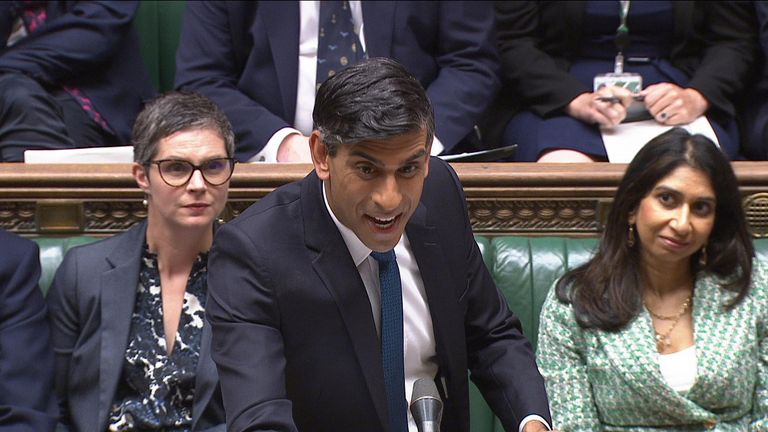
One MP was not so sure: “I point out that I was elected in 2015 when it was the law, we couldn’t have an election for five years… and we had two in three years”.
The prime minister will go for an election if he sees a burst of sunshine breaking through the electoral clouds hanging over the Conservatives.
He could even get a boost just by calling one; polls show that the public is impatient, over half of those questioned want an election by June next year – around 25% want one this year.
For his first year in office the prime minister has been bombarded by events.
He may have been pushed into it but this week was the first time he found the breathing space to launch an initiative.
More long-term ideas from the “real Rishi” are promised in the coming weeks. It is likely that they too will play to the popularist right of the party.
Sunak doesn’t have to appeal to everybody. In their four general election victories the shares of the vote which put the Tories in power were 36.1%, 36.9%, 42.4% and 43.6%.
Electoral Calculus current poll of polls puts Sunak well short of that: Conservatives 27.5% Labour 44.3%. The prime minister will not go quietly.
The Sunak who has shown himself this week will not scruple to do what it takes to shift the dial – short term as well as long term and if he sees the glint of a chance, he’ll take it.